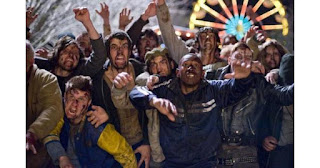Binary Thinking Is At The Heart of Today's Zombieland Chaos
It struck me, then, that this simple binary world view is so alluring to our media-consuming culture because it has been the one that has driven all humans, our social interactions, and our social responses (and perhaps those of our animal ancestors as well) from the beginning and is, therefore, the one with which we are the most comfortable but has become ill suited to addressing the complexities of the modern world.
For the most part this binary world view and approach to challenges has historically enabled us to successfully respond to wars, famines, plague and chaos, to the point that we’ve codified and virtually sanctified that binary thinking and decision-making strategy into our religions, which are fundamentally based on the battle between good vs evil, and our philosophical and psychological frameworks i.e. left vs right, labor vs capital, ally vs. enemy, self vs other, etc.
Even today, our most complex computers that we are using to crunch big data to solve infinitely complex problems use simple binary digits characterized as 0 or 1 as their basic unit of information, which isn’t reflective of the non-binary natural world (The exception is quantum computers that use qubits, which represent data as 0 or 1 or a coherent superposition of both at the same time. This is more reflective of how physics and the ambiguities of the natural world operate, but are still years away).
Given how far we have come successfully as a species, most of us are satisfied to remain within this binary mindset and its immediate applicability to our everyday lives, and are conversely uncomfortable with ambiguity when it comes to morality, categorization and classification, or decision making.
As human societies have become more complex, however, and human driven catastrophes and white swan events that befall them have become more frequent and multifaceted, this binary approach to predicting and solving problems has become increasingly ineffective over time. It still maintains its usefulness in most simple everyday human interactions, provides spiritual and emotional solace in times of stress, but is effectively practicable for broader communal decision making only within simpler social arrangements, i.e. rural, small town communities which are relatively culturally and racially homogenous, where change is slow and typically mamageable, and members of the community have a common understanding of how define their binary elements i.e. good vs. evil, us vs. them, etc. However, in more complex, dynamic scenarios, as in managing diverse mega cities or international crises, our efforts to address problems using a binary approach are becoming increasingly impotent.
It strikes me, then, that much of the current social upheaval that we now face at the hands of Qanon, militias, neo-nazis, conspiracists, election deniers, and so-on is, at its heart, driven by a general frustration that the binary decision making tools that they/we have been raised with and most commonly use every day are failing to enable us to individually succeed within increasingly complex communities, as well as enable society as a whole to address the massive, multi-faceted and ambiguous challenges that we now face, i.e., climate change, ecological collapse, social and economic disruption caused by AI and automation, etc.
Racism, anti-semitism, and xenophobia are not the root causes of our current social chaos, but only familiar artifacts of our antiquated binary world view that protestors are grasping on to and integrating into their narratives to explain changes that are impacting their ability to thrive and that are beyond their comprehension and control. The protestors are two dimensional characters trying to survive in a three dimensional world.
Instead of allowing people to fall prey to Qanon, religious extremism, and other belief systems that fan the flames of extremism and bigotry, we should be building and teaching modern decision making tools that are designed to more effectively function in today’s world. If our current binary world-view is the equivalent of using bits in a computer, perhaps we need to develop a new world view that matches the qbit concept of quantum computers, that is, where ambiguity is built into our decision making tools and processes, and people are taught to be comfortable with wielding them.

.png)

Comments
Post a Comment